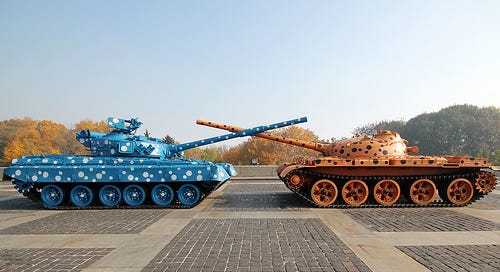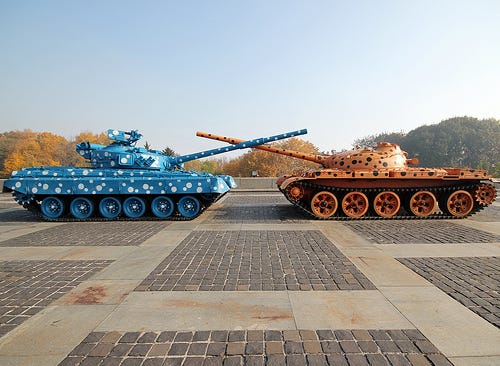Why ISIS is Winning (and Putin Isn’t): How to Understand Civil Wars & Terrorism
How do we understand the civil wars in Syria, Nigeria, and Ukraine?
Is it really just two similarly bad groups that disagree over the color scheme on their tanks (or form of government)?
If we are merely to understand the conflicts in light of the rhetoric surrounding them, we would be induced to view these conflicts as being caused by religion, ethnicity, culture, or some combination of the three. However empirical analysis of civil wars since the end of World War II suggests that these properties are not statistically relevant causes of civil wars. However, they may be fuel that feeds a conflict once it has started.
Civil war literature in the last couple of decades has started applying quantitative theoretical perspectives to the study of civil war and have found several fascinating insights.
Relevant to all these recent studies, we find that loss of political efficacy and/or autonomy; and economic inequality tend to be the major causes of civil wars.
This raises a series of very interesting questions when considering the civil wars that now dominate our new cycle.
Is Culture Relevant?
The first question is so what role does culture play in a civil conflict? Culture could be understood to play the role of some kind of uniting element to a separatist movement.
In order for a separatist movement to achieve it’s war aims in civil conflict it has been shown that that group needs more than just some kind of cultural identity to succeed.
Critical elements for success include
A centralized population in order to speed recruitment.
Funding.
Power parity with the government.
In other words, a separatist group requires a fair degree of mobilization on its part in addition to an ineffective and incompetent government to oppose it.
When we consider the stalemate in Ukraine or Syria versus the successes of ISIS in Iraq we see this dynamic in play.
ISIS has gained control over territory, established independent funding, and has fielded a fighting force able to establish parity in the field vis-a-vis the Iraqi army.
Only timely aerial bombardments and help from Iran has helped stem the onslaught.
The Ukrainian civil war, however, stalemated as soon as Russian-backed rebels moved beyond their population strongholds and the Ukrainian military regrouped and reequipped.
Despite Russian support, the lost of parity helped establish the ceasefire.
Stable Democracies?
A second interesting question is why do strong democracies see you so little internal conflict?
Now it’s important to understand that when I say “internal conflict” I don’t mean an absence of social conflict. What I mean is the condition of civil war, which requires that there be two competing forces and that military deaths be occurring in fairly high numbers.
So getting back to the initial question of why democracies, strong democracies, see little internal conflict.
First, strong, established democratic regimes have efficient extractive powers.
What this means is that they are able to tax and spend effectively.
When we measure gross national product (GNP) and look at the degree to which a government is able to appropriate that gross national product for national purposes we can get a measure of the efficiency of that government.
Governments with higher extractive capabilities are able to not just meet needs of the nation, but are also able to prevent economic benefits accruing to potential internal challengers.
Secondly, strong democracies possess competent law-enforcement.
This doesn’t mean that law-enforcement is always just, or that it is always effective. What it does mean is that it is generally professional, and not typified by corruption.
Thirdly, strong democracies usually have effective political party systems that find constituents across the geographic space of the country.
This means that opposition groups are not only institutionalized, but are national in nature and thus decentralized. This makes it difficult for an opposition group to coalesce in one geographic space in order to effectively mount a militarized opposition to a government power.
So me understand civil wars and conflicts not in light of culture as cause, but as power struggles. Doing so, we get a better framework for understanding the news of our day.
Additionally, we can take some comfort in recognizing that civil wars can be prevented, provided that governments recognize when environments are developing wherein armed opposition groups can grow.
What About Terrorism?
This is actually really helpful for understanding terrorism as well. Terrorist groups could be defined as opposition groups that do not have the funding, recruitment, or power parity to threaten a standing government.
Resorting to terror attacks and appeals to radical ethno-cultural ideas would make rational sense, then, as a way of mounting opposition and retaining recruits when chances of victory are slim to nonexistent.
Indeed, “victory” would have to be nihilistically redefined in terms of maximizing death and destruction of enemy elements in the long term.
In that sense, terrorist groups could almost always to be understood to be a minority opinion. Threatening, but possessing no substantive power.
Does this make ISIS a terrorist organization?
Not really. As I noted in a previous post, ISIS may have terrorist roots and methods, but their organization, funding, land holdings and armaments all point to the fact that they are achieving power parity with the governments of Iraq and Syria.
At the policy level, this means that they cannot be militarily opposed as though they were a terrorist group.
Indeed, that’s exactly what former ambassador to Iraq (2010-12) Jame Jeffrey points out in a recent piece in Foreign Affairs.
Civil Wars Aren’t Created Equal
The biggest lesson to be learned from civil war literature and studies is that while civil wars have statistically predictable causes, they’re not all created equal in that they can be contained the same way.
This requires a very flexible foreign policy on the part of international and regional powers in containing their damage and scope.
The post Why ISIS is Winning (and Putin Isn’t): How to Understand Civil Wars & Terrorism appeared first on Tim Talks Politics.




